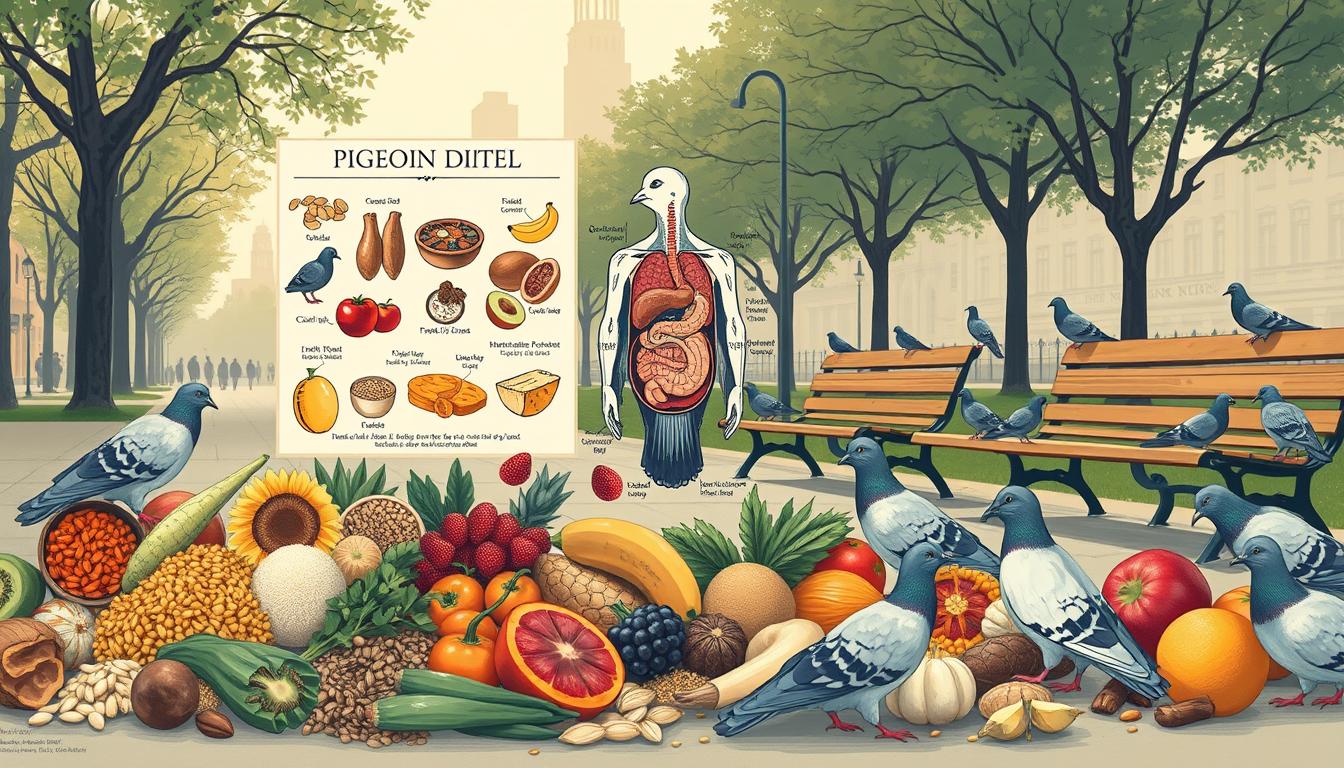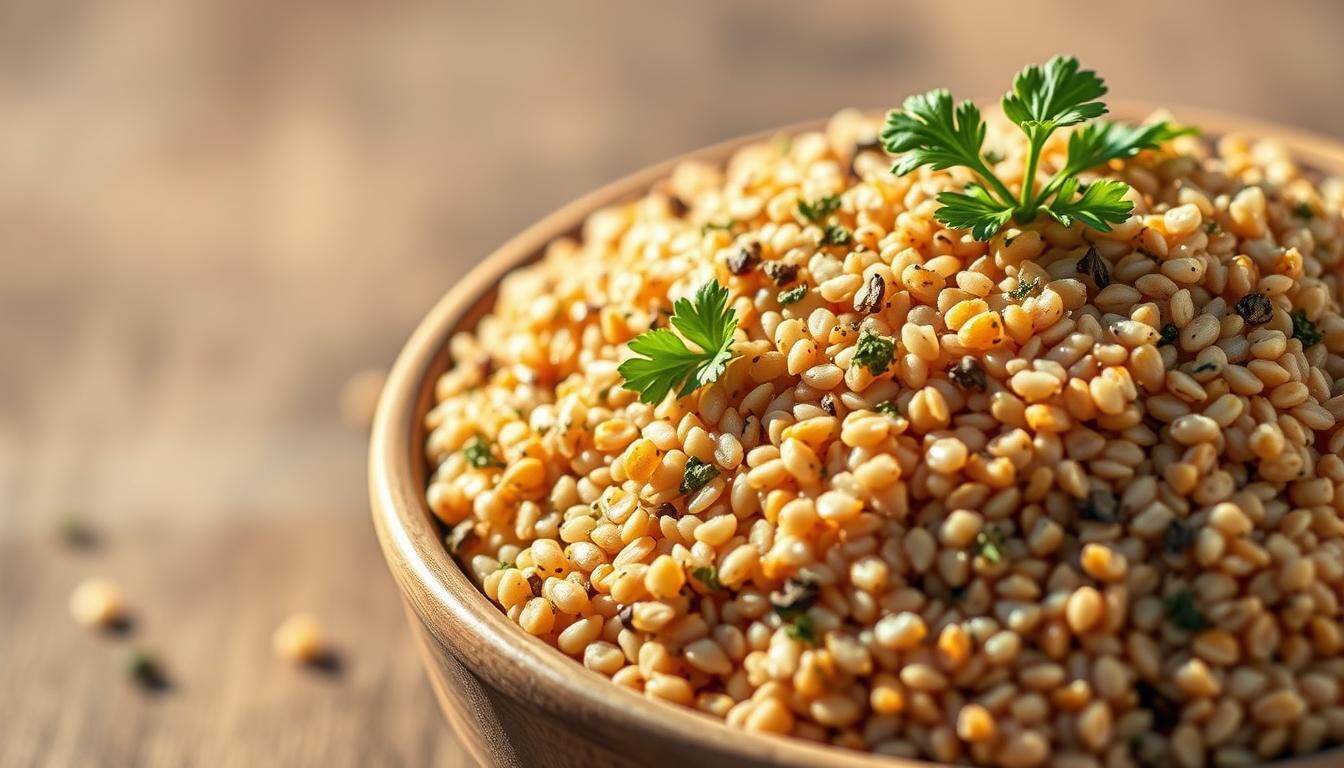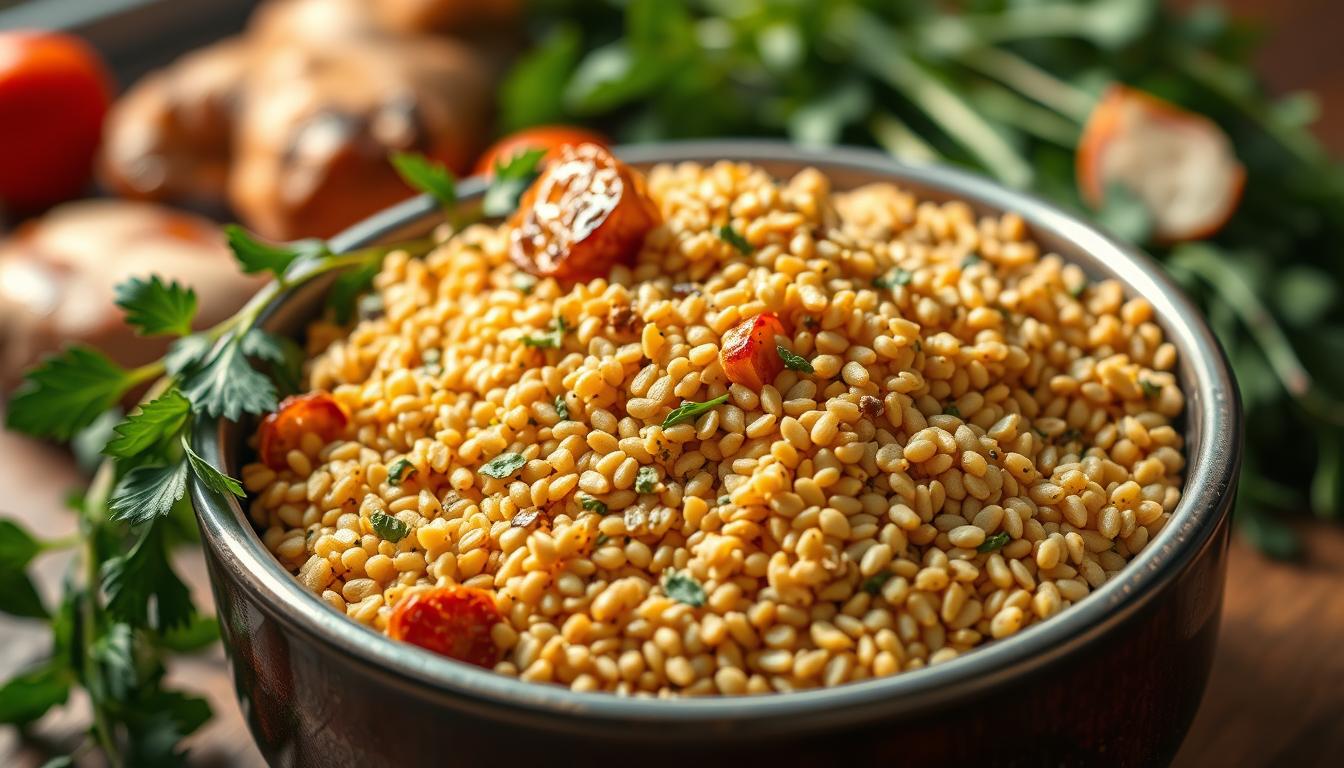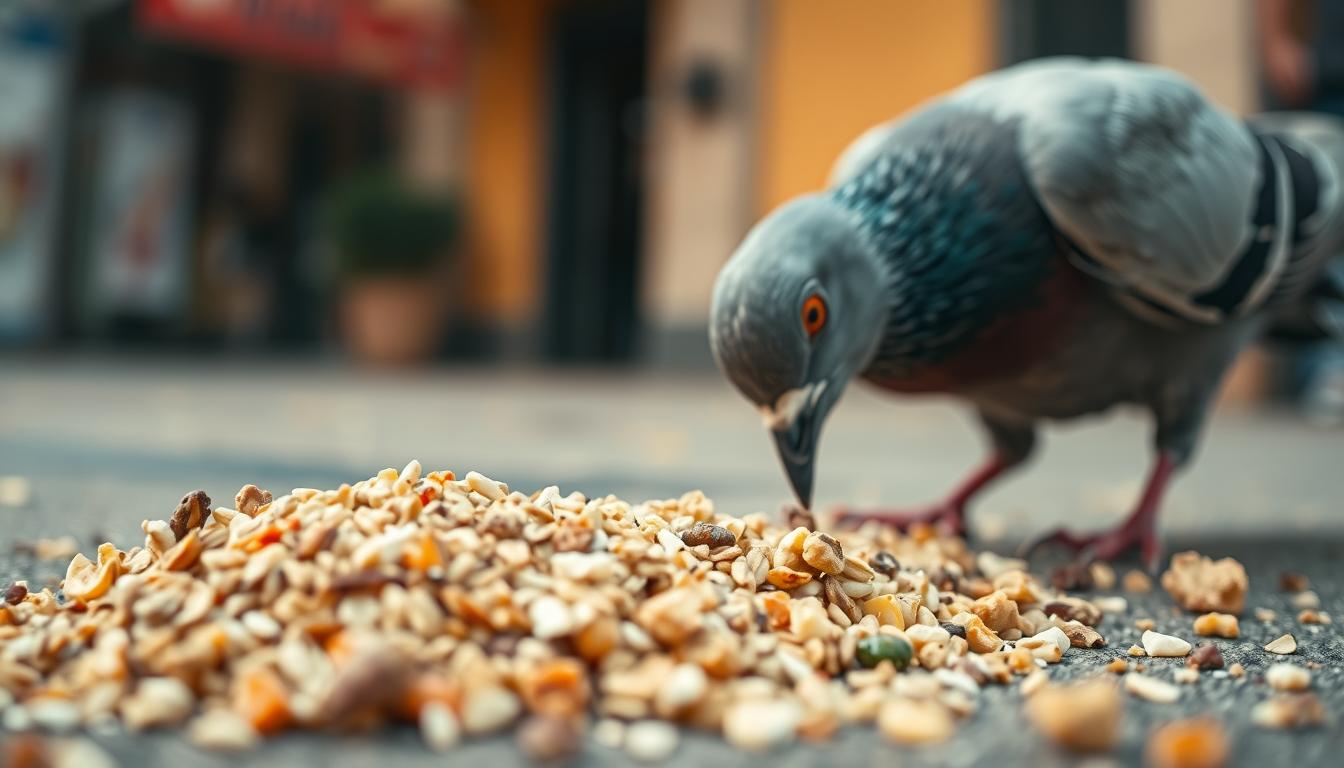Ever watched city pigeons pecking around and wondered about their mysterious diet? As an urban wildlife enthusiast, I’ve spent countless hours observing these fascinating birds. I’ve uncovered the secrets of what can pigeons eat. The world of pigeon food is far more complex than most people realize.
Pigeons are incredibly adaptable creatures, thriving in diverse environments. They can be found from bustling city streets to quiet suburban parks. Understanding their pigeon diet is crucial for anyone interested in these remarkable birds. Knowing the right foods can make a significant difference in their health and survival.
In this guide, we’ll explore the surprising world of pigeon food. We’ll reveal five unexpected safe foods and three that could harm these resilient birds. Get ready to become an expert in pigeon nutrition!
Table of Contents
Key Takeaways
- Pigeons have diverse dietary needs beyond simple bread crumbs
- Some unexpected foods can be safely incorporated into their diet
- Proper nutrition is critical for pigeon health and longevity
- Urban environments offer unique feeding challenges
- Understanding pigeon diet helps support local bird populations
An Introduction to Pigeon Nutrition
Learning about pigeon nutrition is key to keeping these birds healthy. With about 350 species on six continents, pigeons have specific dietary needs. These needs help them grow and live well.
A good pigeon feeding guide shows that a balanced diet is essential. Pigeons need different nutrients based on their age and how active they are.
Essential Nutritional Components
Good pigeon nutrition mixes important nutrients:
- Proteins: Important for muscle growth and development
- Carbohydrates: Give them the energy they need
- Fats: Help with their body’s functions
- Vitamins: A and D are key for health
- Minerals: Calcium is vital for strong bones
Importance of Balanced Nutrition
A balanced diet is crucial for pigeons. Nutritional balance affects everything from egg production to overall health. Racing pigeons, for example, need special diets with more energy during training and races.
Proper nutrition can greatly improve a pigeon’s health, longevity, and performance.
By knowing and using a focused approach to pigeon nutrition, you can help these birds stay healthy. This can also increase their chances of living longer than the usual 50% survival rate in their first year.
Safe Foods for Pigeons
Feeding pigeons needs careful thought about their diet. A balanced diet is key to their health and energy. Knowing what foods are safe and good can help you feed them well.
Whole Grains and Seeds for Pigeons
Seeds are a big part of a pigeon’s diet. Here are some top seeds that are full of nutrients:
- Black-oil sunflower seeds
- Safflower seeds
- Nyger seeds
- Millet
- Pumpkin seeds
Grains are also important for pigeons. Here are some nutritious grains:
- Corn
- Wheat
- Barley
- Quinoa
- Oats
Fruits and Vegetables for Pigeons
Fruits and vegetables can add important vitamins and minerals to a pigeon’s diet. Safe choices include:
- Apples (without seeds)
- Bananas
- Berries
- Peas
- Cooked potatoes
- Corn
Pelleted Feeds
Pelleted feeds are made for pigeons and have all the nutrients they need. They are easy to use and make sure pigeons get a full diet.
Remember to introduce new foods gradually and always provide fresh, clean water alongside their meals.
Surprising Foods That Are Safe for Pigeons
Exploring what pigeons can eat reveals some surprising safe foods. While they mainly eat pigeon feed, some human foods can be a nice change. These foods should be given with care.
Choosing safe foods for pigeons is important. Not all human foods are good for them. But, some can be treats that add nutrients to their diet.
Bread in Moderation
Small amounts of whole grain bread are okay for pigeons. Remember these key points:
- Use only whole grain bread
- Offer in very small quantities
- Ensure bread is fresh and mold-free
Cooked Pasta and Rice
Pigeons can have cooked pasta and rice as treats. These foods are rich in carbs. They should be:
- Plain (no salt or seasoning)
- Served in small portions
- Fully cooked and cooled
Unsalted Nuts
Nuts are a great protein source for pigeons. Select unsalted, raw nuts and chop them into small pieces. Good nuts include:
- Almonds
- Walnuts
- Unsalted peanuts
Remember, these foods are supplements, not meal replacements in a pigeon’s diet.
Foods You Should Avoid Feeding Pigeons
It’s important to know which foods are bad for pigeons. Some foods can harm them a lot. This can lead to serious health problems.
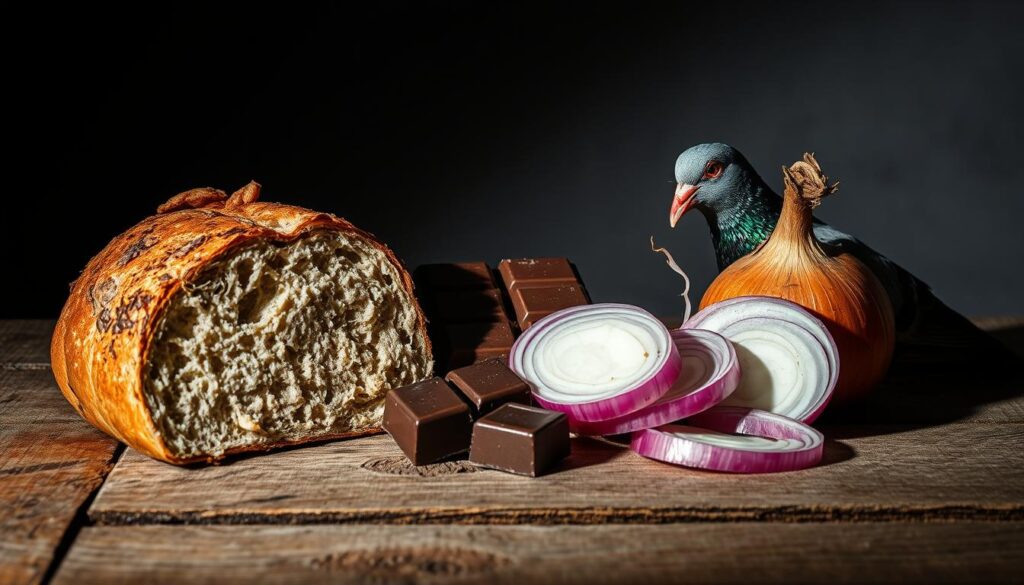
- Chocolate and Caffeinated Products: These can hurt a pigeon’s nervous system
- Processed foods and junk food are not good for their health
- Avocado is bad because it has a toxin called persin
- Salty snacks like potato chips can upset their balance of electrolytes
Toxic Food Hazards
Some foods can be very dangerous for pigeons right away. Chocolate has a toxin called theobromine. Apple seeds and some fruit pits have cyanide, which can upset their stomachs.
Hidden Dangers in Common Foods
There are other foods to avoid in a pigeon’s diet:
- Raw meat can spoil fast
- Moldy bread is bad for them
- Onions and garlic are not safe
- Seeds with a lot of sodium are harmful
It’s important to give pigeons the right food to keep them healthy.
By choosing the right foods, you can help pigeons stay healthy for a long time.
The Role of Fresh Water in Pigeon Diet
Water is key for pigeon health, but often ignored in pigeon feeding guides. Like humans, pigeons need clean, fresh water to stay healthy and function well.
In pigeon nutrition, staying hydrated is crucial. Pigeons need about 1 ounce (30 ml) of water daily. Without enough water, they face health risks.
Why Clean Water Matters
Clean water is essential for pigeons, not just a luxury. Here’s why:
- Prevents dehydration
- Supports digestion
- Regulates body temperature
- Helps nutrient absorption
“Water is life for pigeons, just as it is for all living creatures.” – Avian Nutrition Expert
Optimal Water Management
Here are tips for managing water in your pigeon feeding guide:
- Change water daily
- Use clean, fresh water
- Provide multiple water sources
- Monitor water cleanliness
A hydrated pigeon is a healthy pigeon. Use these water tips in your pigeon nutrition plan for the best bird health.
Common Myths About Pigeon Feeding
Pigeons are often misunderstood when it comes to food. Many think they can eat anything, but the truth is more complex. Misconceptions about pigeon food can actually harm these smart birds.
Let’s debunk some common myths about feeding pigeons:
- Myth: Bread is a perfect food for pigeons
Reality: Bread has little nutritional value and can harm pigeons. While they might eat it, bread doesn’t give them the nutrients they need.
- Myth: Pigeons can survive on any food humans eat
Research shows pigeons have specific dietary needs. What pigeons can eat is different from what humans prefer.
- Myth: Feeding pigeons helps them survive in urban environments
Too much feeding can cause population explosions and spread diseases among pigeons.
Understanding Misinformation
Misinformation about pigeon food can have bad effects. Pigeons are smart birds with complex nutritional needs. Their diet should include whole grains, seeds, and pigeon-specific supplements.
Not all well-intentioned feeding practices are helpful for pigeons’ long-term health and survival.
The Real Impact of Incorrect Feeding
Feeding pigeons the wrong foods can cause serious health issues. A balanced diet is key for their health, immune system, and growth. Knowing what pigeons can eat requires research and knowledge of their nutritional needs.
The Importance of Variety in Their Diet
A diverse pigeon diet is key for their health and nutrition. Pigeons do best with a variety of nutrients from different foods. This variety ensures they get all the vitamins and minerals they need to stay healthy and active.
Offering a varied diet has many benefits for pigeons. Different foods bring unique nutrients that support their health. Here are some key advantages:
- Improved nutrient absorption
- Enhanced immune system function
- Better digestive health
- Increased energy levels
- Stronger feather development
Benefits of Diverse Food Options
When planning pigeon nutrition, mix whole grains, seeds, veggies, and proteins. Racing pigeons need different nutrients than pet pigeons. A diet with maize, peas, and barley gives them the carbs and proteins they need for top performance.
How to Introduce New Foods Safely
Introducing new foods to pigeons’ diets needs patience and careful watching. Start with small amounts of new foods and watch how they react. Follow these steps:
- Introduce one new food at a time
- Offer small portions
- Observe digestive reactions
- Gradually increase portion sizes
- Maintain a consistent feeding schedule
Remember, every pigeon is different, and they may have different tastes. Watch how each pigeon reacts and adjust your diet plan to keep it balanced and enjoyable for them.
Feeding Pigeons in Urban Environments
Urban areas have their own challenges when it comes to feeding pigeons. Cities are full of food, but not all of it is good for these birds. Knowing how to feed pigeons right is key to keeping them healthy and supporting local wildlife.
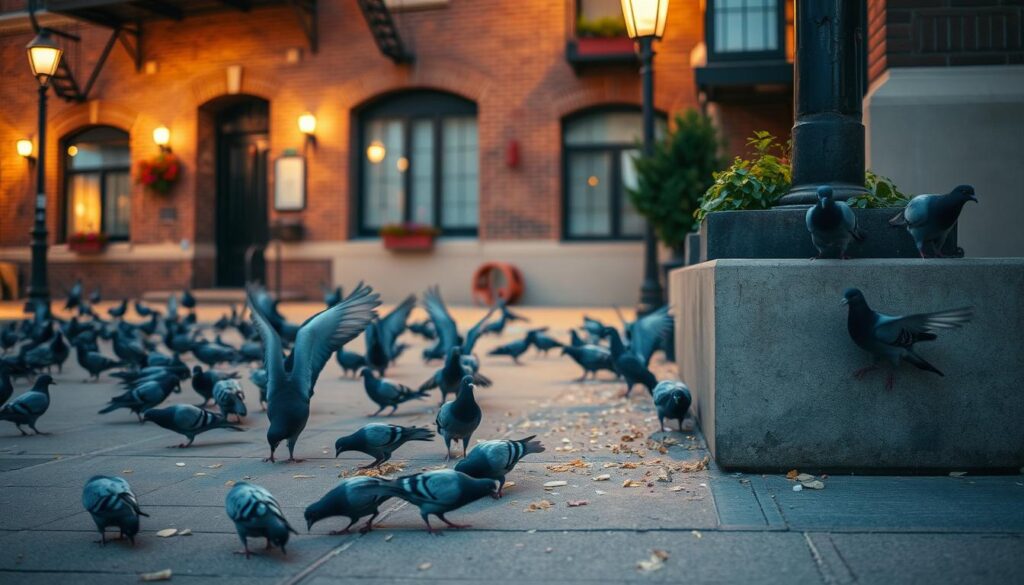
Cities offer a wide range of food for pigeons, but much of it is not good for them. Common pigeon food in cities includes:
- Bread crumbs from street vendors
- Discarded fast food remnants
- Scattered restaurant waste
- Dropped seeds and grains
Common Foods Found in Cities
Pigeons often eat processed foods that are not healthy. While they can live on these foods, they don’t get the nutrients they need. Street foods are often high in salt and preservatives but low in nutrients.
Ensuring Healthy Choices
To help pigeons in cities, it’s better to give them healthier food. Whole grains, seeds, and fresh produce are great options. Feeding pigeons the right way helps keep their populations healthy without harming the environment.
Urban wildlife management requires thoughtful, compassionate approaches to feeding and population control.
By knowing what pigeons need to eat and making smart choices, you can help create a better urban environment. This supports these adaptable birds and helps keep the ecosystem balanced.
Recognizing Signs of an Unhealthy Diet
It’s important to watch your pigeon’s diet to keep them healthy. Knowing the signs of diet problems can help stop serious health issues.
Pigeons show their diet status through behavior and body signs. Spotting these signs can help you change their diet and avoid health problems.
Behavioral Indicators of Poor Nutrition
- Unusual lethargy or decreased activity levels
- Reduced interest in food
- Frequent resting or huddling
- Decreased social interaction with other pigeons
Physical Health Signs
- Dull or ruffled feather appearance
- Unexpected weight loss or gain
- Changes in droppings consistency
- Visible weakness or trembling
A bad diet can weaken a pigeon’s immune system. Young pigeons are especially at risk because their immune systems are still growing.
Spotting nutritional problems early can stop long-term health issues in your pigeon.
Regular vet visits and watching their diet are key to keeping pigeons healthy. By noticing these signs, you can make sure your pigeons get the right food to stay healthy.
Homemade Pigeon Feed Recipes
Making pigeon food at home is a great way to keep your birds healthy. It’s important to know the right seeds and balance of nutrients. This ensures they stay full of energy and health.
When making pigeon food, aim for a mix that’s full of nutrients. Try to match their natural diet but also add variety. This way, they get the best nutrition possible.
Essential Ingredients for Pigeon Feed
- Whole grains (millet, wheat, barley)
- Sunflower seeds
- Cracked corn
- Peas
- Safflower seeds
Creating Your Pigeon Food Mix
Begin by mixing different seeds in equal parts. Focus on a mix that has protein, carbs, and minerals. A good recipe might be:
- 50% mixed grains
- 20% sunflower seeds
- 15% safflower seeds
- 10% dried peas
- 5% additional supplements
Important Feeding Tips
Start by adding new food slowly and watch how your birds react. Always use fresh, clean ingredients. Don’t add salt or processed foods, as they can hurt their stomachs.
Nutrition is the foundation of your pigeons’ well-being. A carefully crafted homemade feed can make a significant difference in their overall health and energy levels.
Conclusion: Ensuring a Healthy Diet for Pigeons
Learning how to feed pigeons right is more than just throwing out bread. They need a mix of about 50% pellets, plus fresh fruits, veggies, seeds, and sometimes mealworms. This mix is key to their health.
It’s important to offer a variety of foods. Apples, berries, peas, and corn are great for them. But, stay away from harmful foods like chocolate, caffeine, and avocado. These can really hurt them.
Keeping an eye on your pigeons’ diet and health is vital. Check their weight weekly, make sure they have clean water, and talk to a vet if needed. With this guide, you’ll help them stay healthy for a long time.
Key Takeaways for Pigeon Nutrition
Understanding and following good nutrition is crucial for pigeon health. Make sure their meals are varied and always choose fresh, healthy foods. This will help them thrive.
FAQ
What are the most important foods for a pigeon’s diet?
Pigeons need whole grains, seeds like sunflower and millet, and fresh fruits and veggies. They also benefit from commercial pelleted feeds. These ensure they get proteins, carbs, and important nutrients.
Can pigeons eat bread?
Pigeons can have a little bread, but it shouldn’t be their main food. Bread lacks nutrients and can make them feel full without giving them what they need. If you give them bread, make sure it’s whole grain and in small amounts.
How much water do pigeons need daily?
Pigeons need fresh water every day. They usually drink 30-50 ml, depending on their size and where they live. Make sure the water is clean, changed often, and in a shallow dish they can easily get to.
Are there foods that are dangerous for pigeons?
Yes, foods like chocolate, caffeine, avocado, processed foods, and salty snacks are bad for pigeons. They can cause health problems, from stomach issues to poisoning.
Can pigeons eat fruits and vegetables?
Yes, pigeons love fruits and veggies like apples, berries, leafy greens, carrots, and peas. They’re full of vitamins and minerals. Just chop them up into small pieces.
How often should I feed wild pigeons?
It’s best not to feed wild pigeons too often. Feeding them too much can make them dependent and mess up their natural ways of finding food. If you do feed them, give them small amounts of balanced food.
What are the signs of poor nutrition in pigeons?
Poor nutrition can show as dull feathers, being tired, losing weight, moving less, and having a weak immune system. Pigeons on bad diets might also grow slower or have trouble reproducing.
Can pigeons eat nuts?
Yes, pigeons can have unsalted nuts like sunflower seeds, peanuts, and almonds. They’re good for protein and fats. But, nuts should be a small part of their diet, not the main food.
How do urban environments affect pigeon diets?
Urban areas often give pigeons bad food like processed stuff and leftovers. City pigeons might not find good food easily. It’s important for city people to know how to feed pigeons right.
Should I create homemade pigeon feed?
Homemade pigeon feed can be good if it’s balanced right. Mix grains, seeds, and dried veggies. But, talk to a bird expert or vet to make sure it’s right for them.
Source Links
- Do Pigeons Make Good Pets? Guidance, Facts & FAQs | PangoVet – https://pangovet.com/pet-lifestyle/birds/do-pigeons-make-good-pets/
- 9 Foods You Should NEVER Feed to Birds – https://www.birdsandblooms.com/birding/attracting-birds/feeding-birds/can-birds-eat-bread/?srsltid=AfmBOoqwhZjmenyWFg1_qT4S_douGOumUbjKT5eZapFBR0g0cQ_UEMNn
- Baby Pigeons: All You Need To Know (With Pictures) – https://birdfact.com/articles/baby-pigeons
- Bird Feed FAQ | Star Milling Co. – https://starmilling.com/bird-feed-faq/
- Effect of Dietary Riboflavin Levels on Reproductive Performance of Pigeon Breeders, and Growth Performance and Carcass Traits of Offspring Squabs – https://pmc.ncbi.nlm.nih.gov/articles/PMC11350774/
- What human food can birds eat – https://www.livingwithbirds.com/tweetapedia/what-human-food-can-birds-eat
- Pigeon Feeding Guide | Read Our Ultimate Guide – https://gladwellspet.co.uk/pigeon-feeding-guide/
- Nutritional Requirements for Racing Pigeons – https://starmilling.com/top-nutritional-requirements-racing-pigeons/
- Can I Feed Backyard Birds Kitchen Scraps And Grains? – Avian Report – https://avianreport.com/feed-backyard-birds-kitchen-scraps-and-pantry-grains/
- 9 Foods You Should NEVER Feed to Birds – https://www.birdsandblooms.com/birding/attracting-birds/feeding-birds/can-birds-eat-bread/?srsltid=AfmBOoqJkWxsMJR8xH3Vt6LEp4cw31neKoC4Jw7m0lbCqzksAfmc4hRq
- Fascinating Pigeon Facts and Figures: 2024 Insights – https://www.ovocontrol.com/pigeon-facts-figures?srsltid=AfmBOooWr1yeRRTrzIymI_gjQtZsYl-eGMyvVp1ErNw1EhdmvXCCPaik
- 9 Foods You Should NEVER Feed to Birds – https://www.birdsandblooms.com/birding/attracting-birds/feeding-birds/can-birds-eat-bread/?srsltid=AfmBOoqz08qRApQCBiQvxkZX2mDdRw3pP5qCqpn2cgbm0UVS0ToP01v6
- Fruits and Vegetables in Birds’ Diets | VCA Animal Hospitals – https://vcahospitals.com/know-your-pet/fruits-and-vegetables-in-bird-diets
- What to do about pigeons – https://www.humaneworld.org/en/resources/what-do-about-pigeons
- Here’s Why Pigeons Are Among the Most Misunderstood Birds – https://www.birdsandblooms.com/birding/pigeon/?srsltid=AfmBOootiUpvEepGzPLolBQv1BcqvTCjScb1u3BmtERZmUFAu1l0nQZQ
- Health Management Programs for all Stages of the Pigeon Year – https://www.auspigeonco.com.au/health-management-programs-for-all-stages-of-the-pigeon-year.html
- Diet and Nutrition in Wild Birds: A Scientific Perspective – https://birdreel.com/blogs/news/diet-and-nutrition-in-wild-birds-a-scientific-perspective?srsltid=AfmBOorJIPrtKyh5SXFODRSidM84CpMRsmNXEVQPPqTkljxfyGZ60NH0
- Managing Risks of Pigeons in Urban Areas | Green City Times – https://www.greencitytimes.com/managing-risks-of-pigeons-in-urban-areas/
- Yeast Infection in Birds – https://www.petmd.com/bird/conditions/digestive/yeast-infection-birds
- The soaring threat: How rising pigeon populations are impacting urban health – Times of India – https://timesofindia.indiatimes.com/life-style/health-fitness/health-news/the-soaring-threat-how-rising-pigeon-populations-are-impacting-urban-health/articleshow/116730314.cms
- Does bird seed go bad and how long does it last? – BirdWatching – https://www.birdwatchingdaily.com/beginners/birding-faq/does-bird-seed-go-bad-and-how-long-does-it-last/
- How to Raise Homing Pigeons – https://www.agriculture.com/family/living-the-country-life/how-to-raise-homing-pigeons
- DIY Homemade Bird Food Recipes – https://www.almanac.com/homemade-bird-food-recipes
- The Secret of Oregano Oil: A Powerful Addition to Pigeon Feed | Pigeon Boss – https://www.pigeonboss.com/2180922_the-secret-of-oregano-oil-a-powerful-addition-to-pigeon-feed
- How Easy is it to Care for Pigeons? | PetMojo – https://www.petmojo.com/how-easy-is-it-to-care-for-pigeons/

